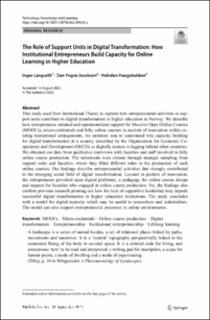| dc.contributor.author | Langseth, Inger | |
| dc.contributor.author | Jacobsen, Dan Yngve | |
| dc.contributor.author | Haugsbakken, Halvdan | |
| dc.date.accessioned | 2022-09-05T09:14:31Z | |
| dc.date.available | 2022-09-05T09:14:31Z | |
| dc.date.created | 2022-09-03T12:30:20Z | |
| dc.date.issued | 2022 | |
| dc.identifier.citation | Technology, Knowledge and Learning, 2022. | en_US |
| dc.identifier.issn | 2211-1662 | |
| dc.identifier.uri | https://hdl.handle.net/11250/3015715 | |
| dc.description.abstract | This study used New Institutional Theory to explore how entrepreneurial activities in support units contribute to digital transformation in higher education in Norway. We describe how entrepreneurs initiated and operationalized support for Massive Open Online Courses (MOOCs), micro-credentials and fully online courses in pockets of innovation within existing institutional arrangements. An ambition was to understand why capacity building for digital transformation in a country described by the Organization for Economic Cooperation and Development (OECD) as digitally mature is lagging behind other countries. We obtained our data from qualitative interviews with faculties and staf involved in fully online course production. The informants were chosen through strategic sampling from support units and faculties, where they flled diferent roles in the production of such online courses. Our fndings describe entrepreneurial activities that strongly contributed to the emerging social feld of digital transformation. Located in pockets of innovation, the entrepreneurs provided open digital platforms, a pedagogy for online course design and support for faculties who engaged in online course production. Yet, the fndings also confrm previous research pointing out how the lack of supportive leadership may impede successful digital transformation in higher education institutions. The study concludes with a model for digital maturity which may be useful to researchers and stakeholders. The model can also support entrepreneurial processes in online environments. | en_US |
| dc.language.iso | eng | en_US |
| dc.publisher | Springer | en_US |
| dc.relation.uri | https://link.springer.com/article/10.1007/s10758-022-09620-y?fbclid=IwAR1lIxBITdT70GIgS3Jq_v5VSQJDYjWt0JR2fevD3A89cafdTaAFugNE5Pk | |
| dc.rights | Navngivelse 4.0 Internasjonal | * |
| dc.rights.uri | http://creativecommons.org/licenses/by/4.0/deed.no | * |
| dc.subject | MOOCs | en_US |
| dc.subject | micro-credentials | en_US |
| dc.subject | online course production | en_US |
| dc.subject | digital transformation | en_US |
| dc.subject | entrepreneurship | en_US |
| dc.subject | institutional entrepreneurship | en_US |
| dc.subject | lifelong learning | en_US |
| dc.title | The Role of Support Units in Digital Transformation: How Institutional Entrepreneurs Build Capacity for Online Learning in Higher Education | en_US |
| dc.type | Peer reviewed | en_US |
| dc.type | Journal article | en_US |
| dc.description.version | publishedVersion | en_US |
| dc.rights.holder | © The Author(s) 2022 | en_US |
| dc.subject.nsi | VDP::Samfunnsvitenskap: 200::Pedagogiske fag: 280 | en_US |
| dc.source.journal | Technology, Knowledge and Learning | en_US |
| dc.identifier.doi | 10.1007/s10758-022-09620-y | |
| dc.identifier.cristin | 2048542 | |
| cristin.ispublished | true | |
| cristin.fulltext | original | |
| cristin.qualitycode | 2 | |

